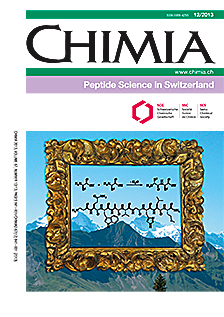Four Decades, Four Places and Four Concepts
DOI:
https://doi.org/10.2533/chimia.2013.868Keywords:
Pegylation, Pseudo-prolines, Switch-peptides, Template-assembled synthetic proteins (tasp)Abstract
Peptide chemistry has experienced enormous progress over the last decades, and the synthesis-oriented peptide scientist is confronted today with research domains at the interface of chemistry, biology and medicine. In this review, we look at some of our contributions over four decades, developed at four places in Germany and Switzerland. Special attention is given to four concepts which can be considered as nucleation seeds for some of today's research topics in peptide chemistry: (1) The use of polyethylene glycols (PEG) as solubilizing carriers in liquid-phase peptide synthesis which has resulted in the well known 'PEGylation' of peptides and proteins, (2) the construction of artificial proteins using topological templates, termed template-assembled synthetic proteins (TASP) which has stimulated the use of templates in peptide and protein design and mimicry, (3) pseudo-prolines which serve today as routine technology for the prevention of peptide self-association and beta-sheet formation in peptide synthesis, thus making accessible solid-phase synthesis of peptides up to the size of small proteins, and finally (4) studies on the onset of secondary structure and conformational transitions in designed oligo-peptides which resulted in the creation of 'switch-peptides' as folding precursors, allowing delineation of the molecular mechanism of protein folding and misfolding as an early step in peptide self-assembly and fibril formation relevant in degenerative diseases.Downloads
Published
2013-12-18
Issue
Section
Scientific Articles
License
Copyright (c) 2013 Swiss Chemical Society

This work is licensed under a Creative Commons Attribution-NonCommercial 4.0 International License.
How to Cite
[1]
Chimia 2013, 67, 868, DOI: 10.2533/chimia.2013.868.







